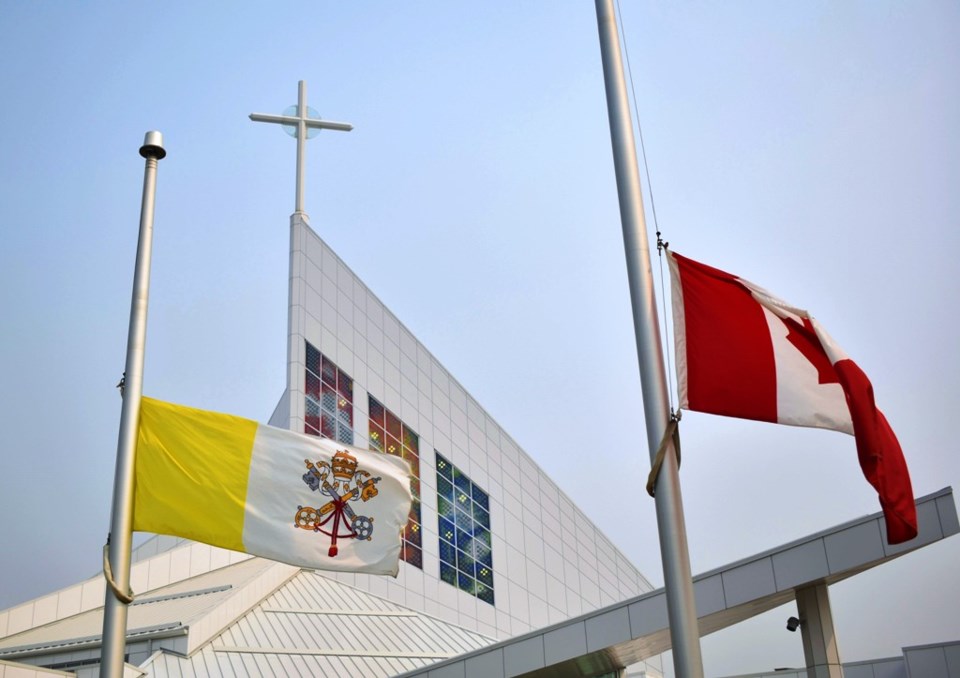Saskatchewan’s Catholic bishops, to fulfill the Indian Residential Schools Settlement Agreement, have made a new province-wide appeal in raising funds that would help the survivors and their respective communities. The agreement states that $25 million would be paid to survivors and focusing on healing and reconciliation, cemeteries on the sites of former residential schools, and education and cultural support.
According to the Roman Catholic Diocese of Saskatoon, the move is part of the ongoing efforts and commitment by the Canadian Catholic church to reach out to Indigenous people for healing and reconciliation.
The Saskatchewan bishops are reviving the fundraising goal made a few years ago of raising $25 million. The previous fundraising move was halted after raising only $3.9 million. Anglican, Presbyterian, and United Methodist churches had fulfilled paying the full amount a few years ago.
Archdiocese of Regina Archbishop Donald Bolen, Ukrainian Catholic Eparchy of Saskatoon Bishop Bryan Bayda of the, Keewatin-Le Pas Archdiocese Archbishop Murray Chatlain, Diocese of Saskatoon Bishop Mark Hagemoen and Prince Albert Diocese Bishop Stephen Hero signed the letter.
“We are deeply grateful for the signs and indications of encouragement and commitment that we have been hearing from the people of Saskatchewan and beyond. It is for all of us to rise to the occasion to be instruments of healing and reconciliation, moving forward in humility, truth, and justice,” the Saskatchewan bishops said in a statement posted on social media.
The new province-wide appeal to raise funds has also gained the support of the Canadian Conference of Catholic Bishops where they said, in a statement released Friday and signed by its president and Winnipeg Archbishop Richard Gagnon, that they are saddened by the legacy brought by the residential schools.
“We are committed to working with Indigenous Peoples and communities towards a greater understanding of the priorities of healing and reconciliation, and how to address them together,” said the statement, adding that bishops in dioceses across the country expressed their readiness to discern local and regional fundraising initiatives.
“The work of healing and reconciliation with Indigenous Peoples is of fundamental importance to our local and national Catholic communities, and to all of us Canadians. By renewing our commitment to work together with them, the Church in Canada pledges solidarity with the Indigenous communities of this land,” Gagnon said in the statement.
The Truth and Reconciliation Commission have been collaborating and in dialogue with survivors and various First Nations leaders such as Chiefs, Elders, Knowledge Keepers, other members of their respective communities.
“The overall goal of this campaign is to support Residential School survivors and their communities, and to engage more deeply in our own ongoing commitment and response to the Truth and Reconciliation process. We have heard the strong request, from Indigenous and non-Indigenous people in various quarters, to initiate a new fundraising campaign to support survivors and engage more deeply in our own ongoing commitment and response to the Truth and Reconciliation process,” the Saskatchewan bishops said in a separate letter.
“Out of these conversations, each diocese and eparchy will discern and communicate separately how they will proceed with the Appeal in their respective dioceses and communities,” the bishops said, noting that a province-wide goal and timeline will be announced by September 2021. As we noted in our July 3 letter, we are deeply grateful for the signs and indications of encouragement and commitment that we have been hearing from the people of Saskatchewan and beyond. It is for all of us to rise to the occasion to be instruments of healing and reconciliation, moving forward in humility, truth, and justice.”
Archbishop Bolen, in a video message, said the fundraising is based on the TRC’s action plan in making a financial commitment to help the survivors and provide initiatives for healing and reconciliation, language and culture, education and relationship building, dialogue between Indigenous spiritual leaders and youth, and address cemeteries of former residential schools
“We would look to be guided by Indigenous communities here in Saskatchewan in terms of the allocation of funds, with a goal of building and strengthening relationships along the way. Nothing is as helpful in charting a way forward as listening to the experience of survivors and hearing directly from survivors and Elders where we can be of assistance in addressing the needs of their communities,” said Bolen.
He added that a lot of wounds were inflicted to the Indigenous community in the history of the province. “Beginning with the First Peoples of this land, their experience of colonization, and most acutely, their experience of the Indian Act and the residential school system. Taking children out of their family context, depriving them on their language, culture and spirituality, caused waves of suffering which continue to be felt today. Other forms of abuse experienced by many, as witnessed through the TRC process, deepened that pain.”
In other news, parishioners of the Indigenous Catholic Parish of Our Lady of Guadalupe Parish has used prayers as their way to deal with the agony of the recent discoveries of unmarked graves of Indigenous children in former residential schools in the province and in British Columbia.
A group of parishioners, last month, traveled to the Our Lady of Lourdes St. Laurent Shrine pilgrimage site in Macdowell, which is 96 kilometers away from Saskatoon and about 30 kilometers southwest of Prince Albert. A four-day memorial wake was held where mass was celebrated and candles were lit representing the children that died in residential schools.
“It is very painful, there’s a lot of anger out there. We need to help each other,” says Parish Life Director Debbie Ledoux.



